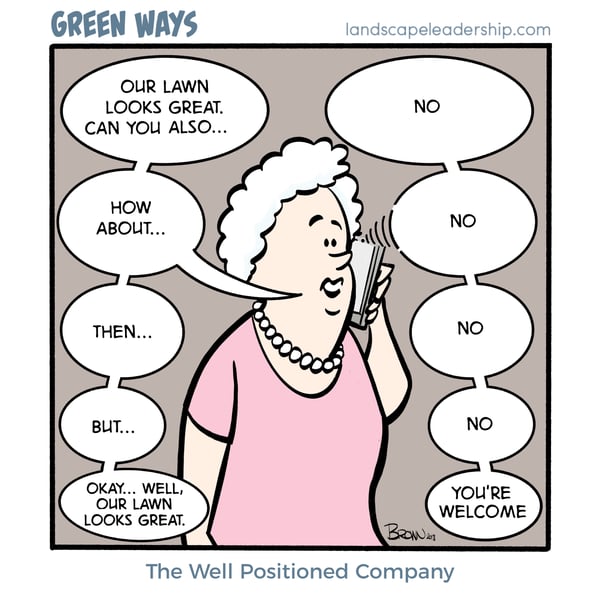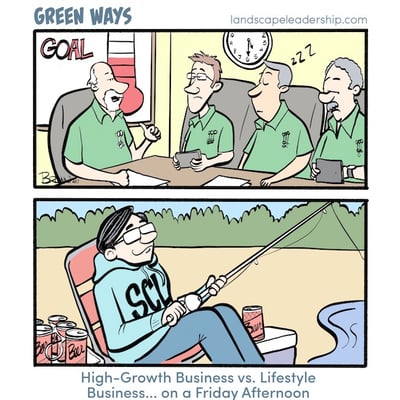Topics: Sales Growth Green Ways Comic
The Benefits of Limiting Your Production Capacity (or, How to Increase Profitability in 2019)
 Author: Chris Heiler
Author: Chris Heiler

Purchase our entire collection of Green Ways comics on Amazon
We've already burned through the first month in a new year, my friends. Wow...
At Landscape Leadership 2018 was one of our best years yet. I can say that based both on the financial goals we achieved as well as the meaningful impact we had on the green industry companies we work with.
I hope you had similar success in 2018.
In this article I want to share the single strategic initiative that I believe led to our success last year.
I think you would be wise to implement this strategy in your own business, whether you are a landscape contractor, lawn care operator, irrigation contractor, arborist, yada yada...
First... the importance of profit
 I would estimate that 90% of you reading this article are operating what I call a lifestyle business as opposed to a high-growth business.
I would estimate that 90% of you reading this article are operating what I call a lifestyle business as opposed to a high-growth business.
Operating as such, it is important that you focus on your bottom line profits to ensure you are pulling enough money out of your business each year to sustain your lifestyle and to to save and invest for your future.
Your opportunity to be acquired is not as likely when operating a lifestyle business when compared to a high-growth model. Make your money now because a big pay day is not guaranteed at the end of your rainbow.
This probably makes sense to you, but, the reality is that profitability does not come easy in our industry. You are keenly aware of this. Very few of you are making the kind of money you expected as a business owner.
To change this, you'll need to stop thinking and acting like Just Another Landscaper, especially as it relates to growth.
When I say "growth", I want you to think about your personal bank account, not your company's top line revenue, number of employees or customers, or size of fleet.
50 pretty trucks on the road doesn't mean you're making any money personally. Let's get clear on that.
Why are most companies in our industry not as profitable as they should be? I don't want to oversimplify this, but here is what I see:
- Too much focus on top-line revenue growth that leads to...
- Offering services you shouldn't be offering to...
- Customers who are not a good fit, and...
- Going too far a distance outside your ideal service area
Essentially, you're taking on work that you have no business taking on. Blame your lack of profitability on that (i.e. Yourself), not on "low-ball" competitors and "cheap" customers.
Fortunately, this is 100% correctable on your end. It'll just take some courage.
Limiting capacity does not mean limiting profitability or growth
What I'm suggesting is that you put a firm limit on your production capacity.
Landscaper Larry: "What are saying exactly?"
Me: "Accept less work."
Landscaper Larry: "What!?!? But... my peer group would laugh at me! And, and... my customers might get butthurt when I tell them 'no'."
Me: "Get over it. You want to be profitable, right?"
At Landscape Leadership, we reserve capacity to work with 15 to 20 companies at any one time. If managed properly, this size client roster allows us to hit our revenue goals and net profit goals without putting unnecessary stress on our team. It also leads to more impactful and meaningful work with the companies who partner with us.
Your capacity will partly be determined by your business model. A landscape design/build firm will obviously have different production capacity when compared to a lawn care operator.
I've seen first hand the many benefits that come with limiting your capacity, some of which include:
- You have fewer customers, accounts, and projects to manage (there's nothing wrong with working less hours and having less stress, my friends).
- You can hire more strategically and intentionally to meet capacity needs versus hiring to keep up with your fluctuating top-line growth.
- Your cost of customer acquisition (COCA) will decrease as your marketing ROI increases because you know your ideal client to say "yes" to and the bad fits to say "no" to.
- You have more flexibility in raising (and lowering) your prices as necessary to reflect your capacity at any one time. You're able to charge a premium price when capacity is maxed out and you have a full sales pipeline of qualified leads waiting in the wings.
- You can use your "limited capacity" to create a perception of exclusivity that can be used as leverage in your marketing and sales. Do not underestimate this benefit.
These benefits amplify each other resulting in higher net profitability.
Landscaper Larry: "Chris, I just want to make more money while working less hours."
Me: "Then limit your capacity until you reach the profit margins you desire."
Wrap up
Look, the economy is great right now and I know a lot of you are growing like crazy. But I also know most of you are not making as much money as you should be personally. I don't want you to grow for growth's sake, I want you to thrive personally as a business owner, which means being as profitable as possible while maintaining a healthy quality of life.
Thriving does not happen without saying no. If you think you have to keep saying yes, you aren’t very confident in your capabilities or positioning or lead generation.1 At Landscape Leadership, we can help you with your positioning and lead generation. Get in touch with us to schedule a meeting and learn how.
I'll dive further into this topic and offer specific suggestions for how to limit your production capacity in a future article. Make sure you are subscribed to this blog so you get the update. Subscribe here or just add your email in the form below.
Purchase our entire collection of Green Ways comics on Amazon
References:
1. Quote from David C. Baker, The One Thing That's Holding You Back




